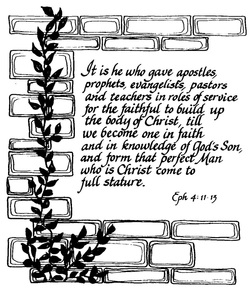 The three letters of St. John are quite short and often seem to be ignored. The first letter encourages Christians to stay strong to the true teachings because falsehoods were being spread. The heretical proselytizers denied that Jesus was God and that sin was real. John begins his letter by giving his credentials. He knew Jesus personally, walked with him day-by-day, saw his miracles, witnessed his death, and ate and drank with him after the resurrection. From that direct experience, he speaks. "That which was from the beginning, which we have heard, which we have seen with our eyes, which we have looked at and our hands have touched --- this we proclaim concerning the Word of life" (1 John 1:1). Who better to know and tell us the truth than one of the original 12 disciples? In fact, John often spent extra time with Jesus as one of the three (along with Peter and James) who was singled out by Jesus (e.g., Matthew 17:1-9). John proclaims what he knows to be the truth. God became man. Jesus Christ is the Son of God. If we believe this, then we have fellowship with one another. This fellowship is both spiritual and social. Spiritually we have the same belief that Jesus is the Messiah and so we have fellowship with the Father and the Son. Socially we are united with fellow believers through good times and bad, through peace and persecution, through death into eternal life. For Reflection: Unity in belief and fellowship helps us to hold fast to the truth. Have I gotten away from Christian fellowship? How intimately do I know Jesus? Let us pray. Jesus, I have not walked with you in the way that John did. Still I long to be by your side, to walk with you, to talk with you, and to hear your voice every day. Nothing else could be as special to me.
0 Comments
 White House Photo, Public domain White House Photo, Public domain "Tear down this wall," President Ronald Reagan famously challenged Soviet leader Mikhail Gorbachev with reference to the Berlin Wall. Later the wall, indeed, did come down. But while that physical wall being torn down was a good thing, Paul warns us not to tear down the spiritual walls that we are as the church of Christ. In the successor to the farming analogy that Paul uses in 1 Corinthians 3, he compares disciples of Jesus to a building with Christ as the foundation (vv. 10-17). We are the building blocks forming the walls standing on the foundation of Jesus Christ. As such, we are the temple and no one should tear us down. Paul wasn't speaking of outsiders tearing down the church when he wrote these words. He was speaking of the fellow members who were tearing each other down with their words, berating and accusing one another. We should not trash each other. Yet often that is what we church members do with our gossip, babble and criticism. Let us rather, as St. Paul so often exhorts us, build one another up, encourage one another, and pray for our leaders. For Reflection: How have I spoken of others/the pastor in my church? How have I encouraged them? Let us pray. Jesus, help me to repair the reputations of those I have trashed. And help me to hold my tongue when a thought is better left unsaid. I want to pray for the people I know rather than criticize them.  We are not only ambassadors who live in an embassy, we are temples of the Holy Spirit. Paul emphasizes this teaching to the believers in Corinth. He first uses it in his exhortation toward church unity. The believers, the members of the church, corporately are one temple in Christ because God's Spirit lives in them as a body of believers (1 Corinthians 3:16). Therefore anyone seeking to destroy the unity of the church, as some evidently were, is seeking to destroy the temple of the Holy Spirit. This is not a good thing. Being united in Christ is an important matter to Paul. He constantly warns against those who would try to separate or cause division in the body. We are not meant to be solitary Christians, or, as some have said, Lone Ranger Christians. We are meant to be part of the body of Christ. The body is composed of a diverse group, yet we are to be one in belief, one in the Spirit, as Jesus and the Father are one (see John 17). For Reflection: Have I done anything to sow dissension in the church? Gossip? Criticism? Let us pray. Lord Jesus, I know that you want us as Christians to be one just as you and the Father are one. That's a tall order, but all things are possible for you. I repent of the times when I have caused or attempted to cause division. I repent of being critical of others in the church. I repent of spreading gossip or rumors.  Sit, walk, build, put off, put on. What's next? In our brief review of Paul's letter to the Ephesian church, we have come across these command verbs. We are to sit with Christ in the heavenly places. This is a time of resting in Him and learning who He is and who we are. When we have done this, we are to walk in the ways Christ has shown us. We are to build one another up into the mature body of Christ. Then put off our old ways, and put on the new ways of Christ. So what is next? Imitate God. Paul writes, "Be imitators of God, therefore, as dearly loved children and live a life of love, just as Christ loved us and gave himself up for us as a fragrant offering and sacrifice to God" (Ephesians 5:1-2). We learn that we are dearly loved children when we sit in the place of rest with him and learn his ways. When we sit with him in the heavenly places, we observe the ways of the kingdom of God. Since Jesus and the Father are one, when we learn the ways of Jesus, we learn the ways of the Father (and the Holy Spirit). That is how we learn what is to be imitated. Children learn by imitating their parents. Even Paul did not begin his apostolic life by going out right away to do things. He began by learning about Jesus and learning new ways of living and loving. He began from that place of rest in Christ before he began to preach. Although he began with "the big reveal", he had to learn to walk all over again. He had to learn to build rather than tear down. He had to put off his old ways before he could put on the new. He had to learn to imitate God when he himself had not seen Jesus in his earthly life. For Reflection: There are many ways to learn to imitate God: reading and studying the Scriptures, prayer, meditation, walking with others who are more mature than we are. And, if we belong to a sacramental church, availing ourselves of the sacraments. Let us pray. Jesus, we know that you do not leave us adrift when it comes to learning how to follow you. Help us, your beloved children, to grow more like you every day. What do you want me to grow in today?  When Paul wrote his letter to the Ephesians (and his other letters), he was writing to a community of people. He envisioned a group of people who were working together and growing together into greater maturity in Christ. They were to do this by fulfilling the roles to which Christ had called them. Some were called to be apostles, some prophets, some evangelists, some pastors and teachers. The goal of all was to prepare the community for works of service among themselves until they should reach maturity. Their first goal was to build one another up into a cohesive unit who know the truth and live as the body of Christ. They were to become such a unit that they could not be swayed by outside influences. If we picture a human body, we realize that all parts grow at a certain rate. In the younger years there is a great rate of growth. In the teen years things can be a little out of balance physically as the body adjusts to greater maturity. But what if the arms decide they are not waiting for the rest of the body to grow? They want to grow now! Disaster results. Unfortunately, I've been in churches where people were growing individually but not corporately. Paul consistently warned against this. He was always pleading for people to get along and to grow in unity. I've also been a part of churches where it seemed the goal was not to build one another up, but to tear one another down. This does not help the body of Christ to grow in unity and maturity either. For Reflection: Am I a source of unity or division in my church? Am I growing together with the body of Christ or doing my own thing? What am I doing to help others grow? Let us pray. There are times, Jesus, when I have been guilty of doing my own thing. There are times when I have torn down rather than built up. Jesus, I want to fit better into your body. I want to be a better member of your body. I want to do my part - the part you have called me to do. I want to fulfill my destiny in you.  Isaiah provides us with many images of the Kingdom of God. He pictures the Lord on a mountain laying out a feast of "rich food and choice wines, juicy, rich food and pure, choice wines". Here the Lord will "destroy the veil that veils all peoples, the web that is woven over all nations" (Isaiah 25:6-8). To me this is the veil of unbelief, the web of deceit that Satan, the father of lies and accuser of the brethren, weaves to keep people from entering the presence of the Lord. By his death, Jesus destroyed the veil that separated the people from the Holy of Holies so that all people could enter in (Luke 23:45; Hebrews 10:19-22). The presence of the Lord is not reserved for the "worthy few" because all have been made worthy by the blood of Jesus. For reflection: How can I make more time to enjoy the feast, to drink the wine of his presence? Let us pray. Today I enter into your presence, Lord. I drink you in.  On the national Mall today there is a commemoration of the 50th anniversary of the March on Washington and the famous "I have a dream" speech by Martin Luther King. Dr. King had a big dream, but God's dream is bigger still. God's dream is contained in Jesus' prayer, "that all may be one, Father, just as you are in me and I am in you. May they also be in us so that the world may believe that you have sent me. I have given them the glory that you gave me, that they may be one as we are one; I in them and you in me. May they be brought to complete unity to let the world know that you sent me and have loved them even as you have loved me" (John 17:21-23). For reflection: Have I bought into God's dream? What am I doing to bring it about? Let us pray. Jesus, we join our prayer with yours today - that we may all be one even as you and the Father are one.  If we look to the early church for evidence of what it means to be a disciple or follower of Jesus, we see several things. They prayed daily in the temple and elsewhere. They fellowshipped and took communion together. They lived in common or at least saw to each other's needs as they grew into a larger group. They attracted new believers through preaching, healing and miracles. The healings and miracles served to confirm the fact that the power of Jesus, who had been crucified and was risen from the dead, was now with his disciples. Healings and miracles were not for the sake of showing power, but so that people would be drawn to listen to the gospel. After hearing the good news, people were being baptized and their sins forgiven. Lives were changing. The gospel still has the power to change lives today if we are not afraid or reluctant to share it with other people. If coming to have a personal relationship with Jesus is the best thing that ever happened to us, why do we hesitate to tell others about him? We don't want to be pushy about it, though, as Peter says, "Always be prepared to given an answer to everyone who asks you to give the reason for the hope you have. But do this with gentleness and respect" (1 Peter 3:15). For reflection: Do I have my answer ready if someone asks me? Let us pray. Lord Jesus, you promised to give us all that we need and to give us words when we need them. I am trusting in your promises. I need boldness, gentleness, respect and the right words.  One of the strangest stories in the New Testament is that of Ananias and Sapphira. We've already been told by Luke, the author of Acts, that the new group of believers was holding things in common (Acts 2:44-45). He mentions this again in 4:32-37 before he tells the story of Ananias and his wife Sapphira. Ananias and Sapphira decide to sell a piece of land and give some of the money to the community (5:1-11). Where they went wrong was that they told Peter they were giving all the money to the group. They lied. Peter, with knowledge from the Holy Spirit, knew immediately that Ananias was lying. Peter questions him and tells Ananias that by lying to Peter he has lied to the whole community and to the Holy Spirit. Ananias fell dead at his feet. Three hours later, Sapphira comes to Peter, not knowing what has happened to her husband. Peter questions her also. She too lies. She too falls dead at Peter's feet. This is an extreme consequence, don't you think? We might say, "Well, it was just a little lie." But the truth is it was an unnecessary lie that would have harmed the community greatly. Prior to this, the community was of "one heart and one mind". The couple didn't just lie, they were trying to look better in everyone's eyes than they really were. So they weren't just dishonest about the money, they were dishonest about their very selves. And in lying to Peter they lied to the entire community and to the Holy Spirit. It's hard enough for a married couple, just two people, to be honest with each other and hold everything in common. This group was trying to do it as a large community (thousands were beginning to believe in Jesus). It did not always go smoothly. Satan continues to tempt us today as he did the early community. Beware the father of lies. For reflection: Am I being honest with myself about the reasons for my actions? Who else is being hurt by what I am doing? Let us pray. Jesus, you are the truth that sets us free. You are the giver of life. Holy Spirit, you are the giver of discernment. We need you to help us see ourselves as we truly are.  Peter and John got off with a warning from the Jewish leaders after the healing of the beggar at the temple. It was a warning they had no intention of heeding. Keeping quiet about Jesus was not an option (Acts 4:18-22). They returned to where the disciples were gathered and reported what had happened. Immediately the entire group began to praise God and to ask him to continue helping them to preach about Jesus. They ended with, "Now, Lord, consider their threats and enable your servants to speak your word with great boldness. Stretch out your hand to heal and perform miraculous signs and wonders through the name of your holy servant Jesus" (4:29-30). The result? "After they prayed, the place where they were meeting was shaken. And they were all filled with the Holy Spirit and spoke the word of God boldly". Once when I was at a prayer meeting I happened to lean up against the wall while the whole group was praising God. The wall was shaking! I believe praise is a key ingredient for enabling us to speak the word of God boldly. Notice that the disciples asked for boldness and then received it -- they spoke the word of God boldly. Praise is still needed today. Boldness is still needed today. For reflection: How much time do I spend praising God as opposed to asking him for things? Have I asked God to make me bold in speaking about him? Let us pray. Father, we praise you for who you are, author of life, ancient of ages, prince of peace, creator of all that exists, sharer of your divine holiness, provider, sustainer, deliverer, healer, savior. "Your love, O Lord, reaches to the heavens, your faithfulness to the skies. Your righteousness is like the mighty mountains, your justice like the great deep" (Ps 36:5-6). (In case you missed it, there was an extra post yesterday for Father's Day. It's a wonderful song of love from the Father's heart.) |
AliceI started this website and blog on May 1, 2012. I am a Catholic who has been in ministry for many years. I first developed what I would call a close relationship with Jesus in the early 1970s. Ever since then I have been praying with people for healing and other needs. It is because I have seen so many of these prayers answered that I am so bold as to offer to pray for you individually through this website and phone line. Archives
July 2021
Categories
All
|
Proudly powered by Weebly

 RSS Feed
RSS Feed